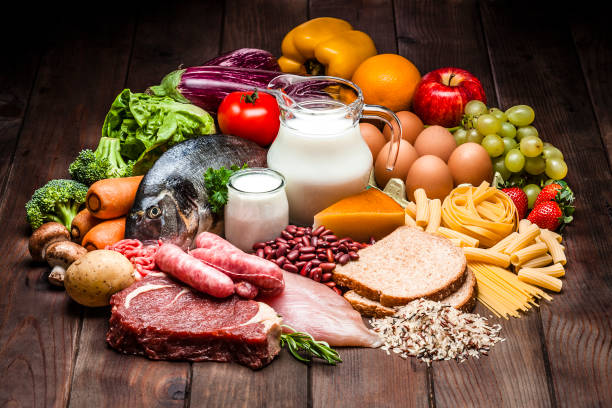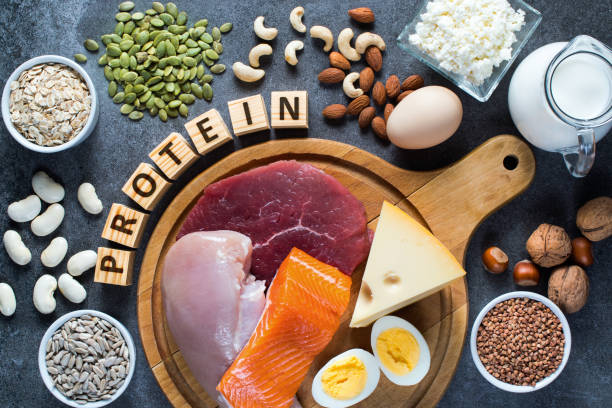Do you want to increase your muscle mass and strength? A high protein diet could be exactly what you need.
Bodybuilders, athletes, and fitness aficionados favour a high protein diet.
It entails eating a lot of protein-rich foods to help in muscle growth and repair.
But how much protein do you really require?
And what are the dangers of a high-protein diet?
We will cover all you need to know about a high protein diet for maximum muscle building in this comprehensive guide.
What is High Protein Diet?
A high protein diet is an excellent place to start for anyone trying to develop muscle, shed weight, or maintain an active lifestyle. Consuming protein-rich foods such as chicken, fish, eggs, beans, and nuts can provide your body with the fuel it requires to grow and repair muscles while also keeping you feeling fuller for longer.
But it’s not simply about adding more protein to your diet; the key to optimal nutrition is finding the correct combination of carbohydrates and healthy fats.
Consult a certified dietitian or use an online calculator to establish your daily protein intake needs depending on your body weight and exercise level.
Understanding the Science behind High-Protein Diets
Protein is a macronutrient that is necessary for muscle growth and repair.
It’s no surprise that high-protein diets are popular among weightlifters and athletes aiming to gain muscle mass and strength.
But how exactly do these diets work?
Think of it this way: protein acts as the building block for muscle tissue. When you lift weights or engage in resistance training, your muscles experience micro-tears. Protein works to repair these tears, resulting in increased muscle mass and strength over time.
By consuming a higher amount of protein, you provide your body with the necessary resources to build and repair muscle tissue more efficiently.

Protein’s Role in Muscle Growth and Repair
Maintaining an active lifestyle is important for overall health, and protein plays a key role in muscle growth and repair.
- Protein contains essential amino acids that our bodies use to build and repair muscle tissue.
- When you exercise, your muscles undergo stress and need time to recover.
- Consuming enough protein can help speed up the recovery process and promote muscle growth.
- High-quality protein sources such as lean meats, eggs, and dairy products are especially beneficial for muscle building.
- Additionally, protein powders and supplements can be a convenient way to increase protein intake.
However, it’s important to consult with a healthcare professional or registered dietitian before starting a high-protein diet, especially if you have any underlying health conditions.
How Much Protein Do You Need?
Determining the appropriate protein quantity for your body is critical for maximising muscle growth and overall health.
Body weight, exercise level, and fitness goals all play a part in establishing your daily protein requirements.
The recommended daily protein intake for most adults is 0.8 grammes per kilogramme of body weight.
Athletes and muscle-building individuals, on the other hand, may require a larger intake ranging from 1.2-2 grammes per kilogramme of body weight.
To discover the best quantity of protein for your unique needs and goals, speak with a licenced dietitian.
Additionally, spreading out protein intake throughout the day and pairing it with other nutrients can enhance its effectiveness in supporting muscle growth and repair.
Protein Quality Matters
When it comes to building muscle and recovering effectively, protein quality is just as important as the quantity consumed. The amino acid profile and digestibility of protein sources can greatly impact their effectiveness in promoting muscle growth.
High-quality proteins such as lean meats, dairy products, and eggs contain all nine essential amino acids that cannot be produced by the body.
On the other hand, plant-based proteins often lack one or more essential amino acids and require careful combination to form complete proteins.
Choosing high-quality protein sources that align with individual dietary preferences can maximize muscle growth potential while ensuring adequate nutrient intake.

Benefits of a High Protein Diet
· Weight Loss and Weight Management
A high protein diet can be an effective tool for weight loss and weight management. Research has shown that increasing protein intake can reduce hunger and increase feelings of fullness, leading to a decrease in overall calorie consumption. Additionally, protein requires more energy to digest than carbohydrates or fat, which can further contribute to weight loss efforts.
· Improved Metabolic Health
A high protein diet can improve metabolic health, making it an appealing option for those seeking to improve their overall well-being. Protein can aid in weight loss and management by improving metabolism and decreasing appetite. Furthermore, because protein requires more energy to digest than other macronutrients, it can help you burn more calories throughout the day.
A high protein diet has also been proven in studies to lower blood sugar levels and enhance insulin sensitivity, potentially lowering the chance of developing type 2 diabetes.
These advantages make a high protein diet worthwhile for those trying to improve their metabolic health.
· Increased Muscle Mass and Strength
Protein plays a crucial role in building and maintaining muscle mass. Incorporating a high protein diet into your routine can help increase muscle strength and size. After exercise, the body needs to repair and rebuild muscles, which requires protein.
Not getting enough protein can lead to muscle loss, but consuming enough of it can help prevent this. Additionally, regulating hormones such as insulin and testosterone is important for muscle growth, and protein has been shown to aid in this process. It’s important to balance your protein intake with other macronutrients for optimal results.
· Better Bone Health
A high protein diet can also benefit your bone health. Adequate protein consumption is required for collagen formation, a fundamental component of bone building.
A high protein diet has been demonstrated in studies to increase bone density and strength, particularly in older persons who are at a higher risk of developing osteoporosis. Incorporating protein-rich foods into your daily diet, such as lean meat, fish, eggs, and dairy products, can greatly improve bone health.
Of course, consulting with a healthcare practitioner or qualified dietitian to determine the optimum quantity of protein for your specific needs is essential.
Risks and Concerns of a High Protein Diet
When it comes to a high protein diet, there are certain risks and concerns that need to be considered.
- One of the main concerns is the strain it can put on the kidneys, which is why it’s important to stay hydrated and consult with a healthcare provider before making any significant changes to your diet.
- In addition, consuming too much protein without balancing it with an active lifestyle or caloric intake can lead to weight gain. It’s also essential to choose lean sources of protein and incorporate a variety of foods for a balanced diet.
- Finally, some high-protein foods may also be high in saturated fats, which can increase the risk of heart disease.
Foods to Include in a High Protein Diet
· Lean Meat and Poultry
When it comes to building muscle, lean meat and poultry are excellent sources of high-quality protein. Not only are they rich in essential amino acids that aid in muscle repair and recovery, but they also help to keep you feeling full and satisfied. When choosing which cuts of meat to include in your diet, opt for lean options such as chicken breast, turkey breast, lean beef, and pork tenderloin.
· Seafood and Fish
Seafood and fish are excellent sources of high-quality protein, making them perfect additions to a high protein diet. Not only are they low in saturated fat, but they’re also rich in omega-3 fatty acids, which have been linked to numerous health benefits. Salmon, tuna, shrimp, and crab are all great examples of high-protein seafood and fish that can be incorporated into your diet to help build lean muscle mass and improve overall health.
· Eggs and Dairy Products
Incorporating eggs and dairy products into your high protein diet can provide an array of essential nutrients required for maximum muscle growth. Eggs are a complete source of protein and contain all the essential amino acids, making them an excellent food to include in your diet. Additionally, dairy products such as milk, cheese, and yogurt provide a good amount of protein along with calcium and vitamin D.
If you are lactose intolerant, there are many lactose-free dairy options available in the market. Some people may choose to avoid dairy due to ethical or environmental reasons, but there are plant-based alternatives available that can provide similar nutritional benefits.
· Nuts and Seeds
Nuts and seeds are also very versatile and can be added to meals or snacks like salads, smoothies, or trail mix. They are also a convenient option for a quick protein boost while on-the-go. However, it’s essential to watch portion sizes as nuts and seeds are high in calories.
· Legumes
Legumes, such as lentils, chickpeas, and beans, are a plant-based protein source that can be easily incorporated into your high protein diet. They are also rich in fiber, which promotes digestive health and helps to keep you feeling full. Additionally, research suggests that consuming legumes regularly can reduce the risk of chronic diseases such as heart disease and type 2 diabetes.

Protein Supplements
Protein supplements can be a convenient way to increase your daily protein intake and support muscle growth.
Whether you’re an athlete, bodybuilder, or someone looking to build lean muscle mass, protein supplements can help you reach your fitness goals. There are different types of protein supplements available in the market, such as whey, casein, and plant-based proteins like soy or pea protein.
- Whey protein is known for its quick absorption by the body, while casein protein is slowly digested and better suited for nighttime use.
- Plant-based protein supplements are ideal for vegetarians and vegans who want to meet their daily protein requirements without consuming animal products.
A high-quality protein supplement can enhance your muscle-building efforts when combined with a balanced diet and regular exercise routine.
Foods to Avoid on a High Protein Diet
- Refined Carbohydrates
- Sugary Foods and Beverages
- Processed Foods and Snacks
Tips for Success on a High Protein Diet
- Stay Hydrated
- Watch Your Portion Sizes
- Be Mindful of Hidden Sources of Protein
- Speak to a Registered Dietitian
Is It Safe for Everyone?
Before embarking on a high protein diet, you must first evaluate whether it is safe for you.
While a high protein diet offers several advantages, including greater muscle building and weight loss, it may not be appropriate for everyone.
Before making large dietary changes, people with specific health issues, such as kidney disease, should speak with a healthcare expert.
For best health, protein intake must be balanced with other nutrients such as carbs and good fats.
Including a range of protein sources, such as lean meats, dairy, legumes, and plant-based choices, will help you get more nutrients.
Remember to stay hydrated and consult with a trained dietitian or healthcare provider to determine the appropriate quantity of protein for your unique needs.
Let’s Sum Up
A high protein diet can help you gain muscle and improve your overall health.
It’s critical to understand the science behind the diet and how much protein you need to achieve the best outcomes.
While there are numerous advantages to a high protein diet, it is critical to be aware of the potential hazards and concerns.
You can grow muscle mass and strength by consuming lean meat, chicken, fish, eggs, dairy products, nuts, seeds, legumes, and protein supplements in your diet while avoiding refined carbs, sugary foods and drinks, and processed snacks.
Keep hydrated, limit your portion sizes, and see a trained nutritionist if necessary.



